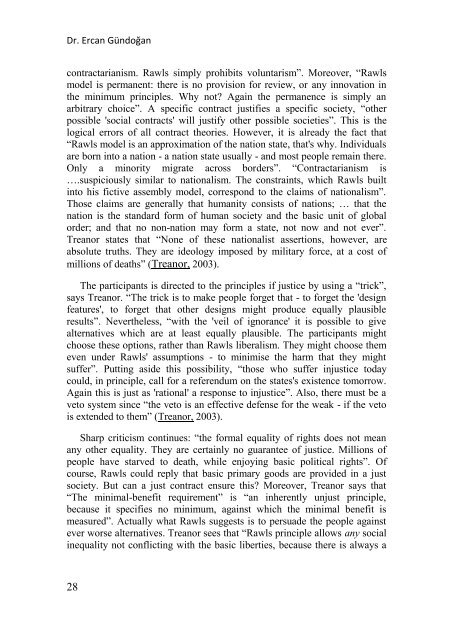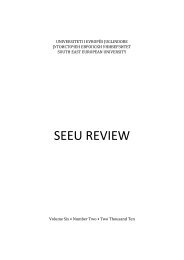SEEU Review vol. 5 Nr. 2 (pdf) - South East European University
SEEU Review vol. 5 Nr. 2 (pdf) - South East European University
SEEU Review vol. 5 Nr. 2 (pdf) - South East European University
You also want an ePaper? Increase the reach of your titles
YUMPU automatically turns print PDFs into web optimized ePapers that Google loves.
Dr. Ercan Gündoğan<br />
contractarianism. Rawls simply prohibits <strong>vol</strong>untarism”. Moreover, “Rawls<br />
model is permanent: there is no provision for review, or any innovation in<br />
the minimum principles. Why not? Again the permanence is simply an<br />
arbitrary choice”. A specific contract justifies a specific society, “other<br />
possible 'social contracts' will justify other possible societies”. This is the<br />
logical errors of all contract theories. However, it is already the fact that<br />
“Rawls model is an approximation of the nation state, that's why. Individuals<br />
are born into a nation - a nation state usually - and most people remain there.<br />
Only a minority migrate across borders”. “Contractarianism is<br />
….suspiciously similar to nationalism. The constraints, which Rawls built<br />
into his fictive assembly model, correspond to the claims of nationalism”.<br />
Those claims are generally that humanity consists of nations; … that the<br />
nation is the standard form of human society and the basic unit of global<br />
order; and that no non-nation may form a state, not now and not ever”.<br />
Treanor states that “None of these nationalist assertions, however, are<br />
absolute truths. They are ideology imposed by military force, at a cost of<br />
millions of deaths” (Treanor, 2003).<br />
The participants is directed to the principles if justice by using a “trick”,<br />
says Treanor. “The trick is to make people forget that - to forget the 'design<br />
features', to forget that other designs might produce equally plausible<br />
results”. Nevertheless, “with the 'veil of ignorance' it is possible to give<br />
alternatives which are at least equally plausible. The participants might<br />
choose these options, rather than Rawls liberalism. They might choose them<br />
even under Rawls' assumptions - to minimise the harm that they might<br />
suffer”. Putting aside this possibility, “those who suffer injustice today<br />
could, in principle, call for a referendum on the states's existence tomorrow.<br />
Again this is just as 'rational' a response to injustice”. Also, there must be a<br />
veto system since “the veto is an effective defense for the weak - if the veto<br />
is extended to them” (Treanor, 2003).<br />
Sharp criticism continues: “the formal equality of rights does not mean<br />
any other equality. They are certainly no guarantee of justice. Millions of<br />
people have starved to death, while enjoying basic political rights”. Of<br />
course, Rawls could reply that basic primary goods are provided in a just<br />
society. But can a just contract ensure this? Moreover, Treanor says that<br />
“The minimal-benefit requirement” is “an inherently unjust principle,<br />
because it specifies no minimum, against which the minimal benefit is<br />
measured”. Actually what Rawls suggests is to persuade the people against<br />
ever worse alternatives. Treanor sees that “Rawls principle allows any social<br />
inequality not conflicting with the basic liberties, because there is always a<br />
28

















